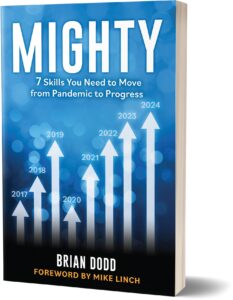“My job is to come in and just let them know that I can help them become a better player. Not because I tell them I can help them be a better player because daily over and over again I show them that I can.” – Philadelphia Eagles head coach Nick Sirianni via this article from Coaching Coaches
Everybody gets better with a coach. This is one of the axioms I live my life by because no one is perfect. Everyone needs someone to help them get better. Among other things, coaches help us with skill development, marginal gains, accountability, and see things in us we do not see. This is why I wanted to share Coach Sirianni’s statement with you.
An Opportunity To Learn About Great Coaching
Today I spent a couple of hours with Lewis Preston, pictured here. Lewis is one of the founders of Athletes 2 Leaders, an organization who empowers youth to pro athletes through mentorship, seminars and workshops focused on cultivating lifelong physical, emotional and financial stability so they can positively impact society.
Prior to his current role as advisor to numerous college basketball coaches and his work with athletic directors with coaching searches and administrative duties, Lewis was an assistant coach for head coach Billy Donovan on the Florida Gators back-to-back national championship teams in 2005-2006 and 2006-2007. I never miss an opportunity to learn from this man when it comes to coaching and achieving high-performance.
The purpose of our time today was to learn from what he is currently seeing in great coaches. The following is what I learned.
Great Coaches Understand The Value Of Redshirting
Great coaches redshirt players, ideas, and concepts. Redshirting simply gives people and things time to mature. And when something is mature, is then the right time to roll it out.
Lewis said, “Great coaches keep two or three things in their pocket for special offerings.” He gave examples like running a special offense which they’ve only practiced, something specific for late-game situations or when a player who suddenly does something unexpected. Lewis also pointed out, “It takes courage to take that risk because of (potential) failure.”
Great Coaches Look For Unique Skills
Recruiting is the lifeblood of any successful organization. Lewis advises coaches to ask themselves, “What is the most unique skill of the person you’re recruiting? Some of the best leaders are not in the starting five.” He then gave me a brilliant thought, “The most unique skill is you want to get better.”
For example, Coach Donovan knew how to help players take the next step in their development. Lewis said of one of the team’s star players Joakim Noah, “Joakim loved getting better everyday. His punishment (for poor efforts or decisions) was asking, ‘This will get you better?'”
The Characteristics Of Great Teams
Lewis said what made those Gator teams so great was “No one on Florida wanted to disappoint the group. The transfer portal makes this harder.”
He then recounted a story of an ascending program in men’s college basketball. The interesting thing is that this year’s team was more talented than the one from the previous two seasons. When Lewis inquired as to why, the coach gave the following reasons:
- “The best player is my most selfless player.”
- “Everyone knows their role.”
- “We don’t care who scores as long as we win.”
This is in direct contrast to today’s social media and entitled culture. Lewis made an interesting observation. He said, “The night LeBron (James) broke the scoring record was the apex of the AAU… They lost the game. It was the apex because of how we have devalued winning. They valued the individual over winning.”
A Great Coach’s Character
One of the primary qualities Lewis looks for in potential clients and the coaches he recommends to ADs is character. He said, “I interview the wife. How do they treat their wife and kids?” Lewis added, “The question people don’t ask enough is how many times have players sat in the coach’s living room outside of coaching?”
Lewis said the best coaches are relational, not transactional.
The Role, Duty, and Expectation of a Coach
In conclusion, the following is an excerpt on the role, day, and expectation of a coach from my new book Mighty: 7 Skills You Need to Move from Pandemic to Progress. Releasing March 21st, you can pre-order your copies by clicking HERE or on the image below.
A coach is a model. Lee Seras, scouting supervisor for the Cincinnati Reds said, “Become a model and a leader.” A coach trains and develops players. Luke Wrenn, retired scout from the Seattle Mariners, Boston Red Sox, and Arizona Diamondbacks, said a coach’s job is “to develop the players to be the best that they can be.” A coach imparts knowledge. Wrenn added that a coach is “to be an example to them and to impart knowledge.”
A coach meets you where you are at. Kevin Wilson, one of the most sought-after hitting consultants in the game and currently working with minor and major league players from twenty different MLB organizations, said, “Meet them where they’re at.” A coach creates a path for you and guides you in it. Kevin added that a coach will “guide them in a path you want them to go in.”
A coach is a mentor. Rich Sparks, scout for the Oakland A’s, said, “Be a mentor.” A coach teaches you to take responsibility. Rick Robinson, former college baseball coach for over twenty years and currently a missionary with SCORE International said, “Teach them to take responsibility.” A coach teaches you to operate within the context of a team. Rick concluded by saying a coach also teaches you “how to participate and operate as a team player.”
What is one thing you learned from this article which will make you a better coach?
 Also, my latest book Mighty: 7 Skills You Need to Move from Pandemic to Progress is available for purchase. Production. Passion. Resilience. Teamwork. Contentment. Courage. Faith. These seven skills were embodied over three thousand years ago by a group of elite warriors known as David’s Mighty Men. These highly-capable individuals helped take David, the man who had previously defeated Goliath, from a wilderness experience to leading a nation. Did 2020 feel like a wilderness experience for you? So many people lost loved ones, opportunities, financial resources, careers, time, and much, much more during COVID. The worst thing many people lost was hope. COVID stripped away the non-essentials in our lives. It revealed how foolish pride, ego, and narcissism are. It made us question almost everything in our lives, including God himself. COVID brought us all to our knees in one form or fashion. I want you to know the same skills used by David’s’ Mighty Men still work today. In my new book Mighty: 7 Skills You Need to Move from Pandemic to Progress, I show you how applying these skills can help you become Mighty and move from the Pandemic to Progress. Click HERE or on the image provided to order!
Also, my latest book Mighty: 7 Skills You Need to Move from Pandemic to Progress is available for purchase. Production. Passion. Resilience. Teamwork. Contentment. Courage. Faith. These seven skills were embodied over three thousand years ago by a group of elite warriors known as David’s Mighty Men. These highly-capable individuals helped take David, the man who had previously defeated Goliath, from a wilderness experience to leading a nation. Did 2020 feel like a wilderness experience for you? So many people lost loved ones, opportunities, financial resources, careers, time, and much, much more during COVID. The worst thing many people lost was hope. COVID stripped away the non-essentials in our lives. It revealed how foolish pride, ego, and narcissism are. It made us question almost everything in our lives, including God himself. COVID brought us all to our knees in one form or fashion. I want you to know the same skills used by David’s’ Mighty Men still work today. In my new book Mighty: 7 Skills You Need to Move from Pandemic to Progress, I show you how applying these skills can help you become Mighty and move from the Pandemic to Progress. Click HERE or on the image provided to order!

